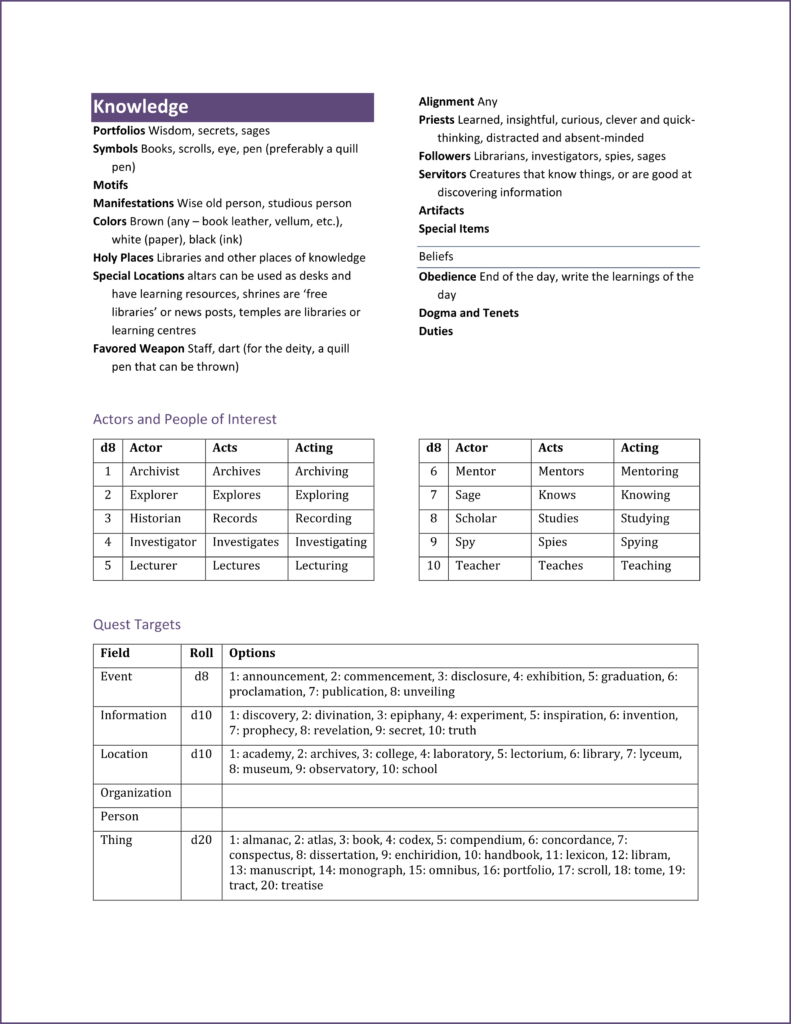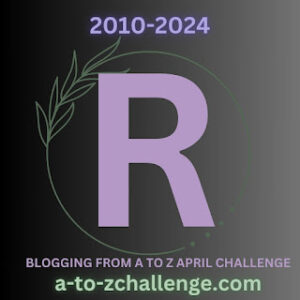Yet again, “what I planned to write” and “what I wrote” don’t quite match.
They’re related, of course. But they’re not the same.
I’d expected to write about domain-specific word choices (i.e. more random tables). I started to work up some examples, and realized they might take up a fair amount of space. In fact, even the really rough layout I started fills (for a reasonable-whitespace definition of ‘fills’) a page… and I’m not even done yet.
I’ve added a couple of tables to the Knowledge domain. First is ‘Actors and People of Interest’, second is Quest Targets.
Actors and People of Interest
‘Actors’ was prompted while noodling how to create epithets for deities. They show three columns (Actor, Acts, Acting) because I imagine I’ll want to use different formats. That is, my epithet table could include entries such as
| Template | Example |
|---|---|
| The Actor | The Watcher |
| The One Who Acts | The One Who Watches |
| The Actor in State-or-Location | The Watcher in Dreams |
| The Actor, Acting in State-or-Location | The Watcher, Lurking in Shadows |
| The Descriptor Actor | The Silent Watcher |
There are likely to be more templates when I’m done, here I’m just illustrating why I’ve got three entries for each actor.
For the Knowledge domain, first draft has the table below.
| d10 | Actor | Acts | Acting |
|---|---|---|---|
| 1 | Archivist | Archives | Archiving |
| 2 | Explorer | Explores | Exploring |
| 3 | Historian | Records | Recording |
| 4 | Investigator | Investigates | Investigating |
| 5 | Lecturer | Lectures | Lecturing |
| 6 | Mentor | Mentors | Mentoring |
| 7 | Sage | Knows | Knowing |
| 8 | Scholar | Studies | Studying |
| 9 | Seeker | Seeks | Seeking |
| 10 | Spy | Spies | Spying |
| 11 | Teacher | Teaches | Teaching |
| 12 | Watcher | Watches | Watching |
This might let me remove ‘Followers’ from the domain template. The list here is even longer than I have for that field in the Knowledge domain.
Or I could repurpose Followers to describe characteristics of them. Perhaps I’ll merge Followers and Priests, I have the sense that if the two fields both describe people, they’d be much the same text.
Quest Targets
The Quest Table from yesterday’s post includes the following six targets: Event, Information, Location, Organization, Person, Thing.
I’ve identified some options for most types of target, as shown below.
| Field | Roll | Options |
|---|---|---|
| Event | d8 | 1: announcement, 2: commencement, 3: disclosure, 4: exhibition, 5: graduation, 6: proclamation, 7: publication, 8: unveiling |
| Information | d10 | 1: discovery, 2: divination, 3: epiphany, 4: experiment, 5: inspiration, 6: invention, 7: prophecy, 8: revelation, 9: secret, 10: truth |
| Location | d10 | 1: academy, 2: archives, 3: college, 4: laboratory, 5: lectorium, 6: library, 7: lyceum, 8: museum, 9: observatory, 10: school |
| Organization | ||
| Person | ||
| Thing | d20 | 1: almanac, 2: atlas, 3: book, 4: codex, 5: compendium, 6: concordance, 7: conspectus, 8: dissertation, 9: enchiridion, 10: handbook, 11: lexicon, 12: libram, 13: manuscript, 14: monograph, 15: omnibus, 16: portfolio, 17: scroll, 18: tome, 19: tract, 20: treatise |
I kept Organization and Person here for completeness, and I might remove them. It’s not clear to me that they actually add much, beyond keep the list complete.
- Person can simply use the Actors and People of Interest table above. There could be other people of interest, but they’re likely dependent on the campaign circumstances.
- Organizations are likely dependent on campaign circumstances. Domain-suggested organizations can probably be derived pretty easily from the People of Interest table (sage’s guild) or Location (college faculty).
Where other tables I’ve created like this have had suggestions in the Options column, presented as random lists. In this particular case I have the urge to add explanations of the nature of the choices, and suggest ways of finding more. For instance, the Information shown here is focused on academia or ‘knowing stuff’ (as opposed to the War domain wanting specifically the enemy’s strategic plans), but for the Knowledge domain information of any type is appropriate.
Likewise, Thing here lists many types of written material. Of course other formats could be appropriate, but there aren’t many Blu-Ray discs in D&D-land. Like Information, Thing could include something to be studied — any strange artifact could be an appropriate Thing for the Knowledge domain.
I don’t know that I’d want to tamper with making that a note in the list for either row, though. I think this might be specific to the Knowledge domain, and I might be able to get away with footnoting the table.
What Comes Next?
These are just a couple of the domain-specific random tables I can see.
I like presenting artifact names in the domain stat block, I find they can be fairly evocative. So far, I’ve got tools that let me generate names irrelevant of the domains, and then I select from the longer list. Surely I can identify domain-specific descriptors and generate lists that lean toward the domain I’m looking at. Though me being me, I’d almost certainly have a certain amount of ‘use generic term’ or ‘use from another domain: The Devastating Libram of Tollerine might be full of life-changing (and possibly life-ending) secrets.
I can already lean on the Thing row of the Quest Target table, I’ve mentioned artifact descriptors above, but I could conceivably list enchantments or specific items by item type. I’m not sure about this one. I’m leaning more toward something like the Diablo D&D supplement magic item table, where the various enchantments are named and have specific meaning. I might be able to do something like that.
Place names could use their own descriptors, that might not be appropriate for artifacts.
Not appropriate for this work, but I expect to discuss and might include a template or worksheet for (or add to the Polyhedral Pantheons workbook… actually, almost certainly will) a way to easily cross-index the deities with their domains. Right now the ‘deity names’ in the artifact names are wholly random (within the limits of the generator, of course) and there is no direct connection to the domains. If we name the deities of Knowledge, one could expect that artifacts associated with the Knowledge would be attached to those deities. Or not, of course; there can certainly be more deities than are obvious here.
Closing Comments
I’m sure I’ll find more random tables that can be suitable for each domain. As I explore this, I start to think the tables may be more useful than the stat blocks.
In fact, I wonder if I could replace the stat blocks with basically a table like the Quest Target table:
| Element | Roll | Options |
|---|---|---|
| Portfolio | d3 | 1: wisdom, 2: secrets, 3: sages |
| Symbol | d4 | 1: book(s), 2: scroll(s), 3: eye, 4: pen (preferably quill) |
| Motif | ||
| Manifestation | d6 | 1: wise and old, 2: studious, 3: curious, 4: insightful, 5: absent-minded, 6: pedantic |
(I recognize the manifestation is mostly about personality… other domains might have more physical or visual elements to the manifestation.)
… not all the stat block can be easily replaced this way, but I feel like enough of the stat block could be that I have to consider it.
In the meantime, I’ve put together a rough draft of a layout with the new content. If I add any more, even just populating the fields I’ve got blank now, I’m sure I’m going to need two pages per domain. Even just filling in the blank fields in this one, I might have trouble fitting on a single page.
And I’m pretty okay with that. It feels like I’m moving from ‘pages of suggestions you can read and think about’ to ‘functional tool to give prompts’… you can still just read and think about.


